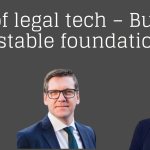Sooraj Shah looks at the trends among the Big Four and law firms when it comes to hiring in the latest data must have.
Exploiting data to gain a competitive advantage is nothing new; every law firm will have been striving to do just this over the last few years, albeit with varying levels of sophistication and success. But as the value of the data held by law firms becomes better understood and the technology enabling us to analyse it matures, there is a new urgency in the race to use data to compete. Key to making the most of the data at a law firm’s disposal is a specialist skill set that is very difficult to obtain – that of a data scientist.
Many mistakenly believe a data scientist is just a synonym for a data analyst, but this is wide of the mark. While data analysts have been around for many years and continue to play an important role in the legal industry, data scientists are a relatively new breed. They have skills in mathematics, statistics and modelling that go far beyond that of a data analyst; meaning that they can help to develop technologies in-house that can glean more insight from data, and that they can also use a wider range of technologies on the market.
One of the data scientists’ core strengths is knowing the right questions to ask and ensuring that the quality and governance of the data is at a high level. Law firms are increasingly concluding that this is a skill set that can set them apart from their competition. With troves of data such as emails, documents and time entry narratives requiring specialists to structure and analyse it appropriately, data scientists are high on the recruitment priority list for law firms.
According to Christian Zust, director of client technology at law firm Bryan Cave Leighton Paisner, this is because firms are beginning to appreciate the role analytics plays in enhancing strategic decision making. “Many have been using historical rate and hours data for years to help accurately price legal work and others actively recruit data scientists and have dedicated teams of professionals to lead analytical projects aimed at internal process improvement,” he says. Zust suggests that firms are bringing in data architects who can help them understand how their data is structured and stored in their systems and then suggest improvements, making collection of data more reliable and easier to retrieve, while data scientists who can “crunch the numbers” have been recruited to uncover insights that can help to improve current processes or strategy.
Within their attorney base, firms are actively recruiting associates and partners who understand how to use data to enhance their practice – this could be attorneys in litigation, pouring over task-level data to eliminate overlap in process, or entrepreneurial employment attorneys who can recommend investments in management training based on emerging trends in their clients’ employment claims. But data science is perhaps most useful in aiding law firms in the way they can help their own clients. Knowing more about data and being able to act on this knowledge accordingly is the reason there is growing clamour for data scientists within the legal sector.
The Big Four approach
Although it’s a positive step that law firms are looking outside of their traditional horizons and working out how to catch up with other industries, hiring technical expertise alone is not, or should not be the end goal.
A glance over at the Big Four professional services firms suggests that what is needed is an (in itself futuristic sounding) hybrid, combining data science and domain expertise.
The Big Four firms have not only been hiring data-savvy auditors, but they’ve been looking at a cross between an auditor and a data scientist. This means pairing an auditors’ skill set with the ability to understand capturing, manipulating and visualising data. Essentially, who better to know how data science can be applied to the industry than an industry expert themselves?
Zust believes that this Big Four approach is the right one because they’re not using data science to replace accountants but rather to enhance the way accountants deliver value to their clients.
While this type of hybrid role is still rare in the legal sector it does exist and has done for some time: Bennett Borden was named US law firm Drinker Biddle & Reath’s first-ever chief data scientist in May 2015. Borden, who was originally a lawyer, had gone back to university to get a master’s degree in business analytics. At the time he told tech company Relativity, that there was no part of the law that couldn’t be aided with the use of analytics. But crucially, he suggested that while data analytics professionals could help with the core analysis, law firms and service providers go beyond this and help the company understand the legal and ethical implications of how they are using analytics and what potential consequences – whether they’re good or bad – they may face by using the data in a certain way.
“More than that, we can provide the legal support to handle those consequences,” Borden said.
Borden isn’t alone. Andrew Dunkley is head of analytics at UK top 50 insurance law firm BLM. He is a qualified solicitor with change management experience and now he leads a team of data scientists developing new ways of applying predictive analytics to the law.
He explains that his team’s mission is to “predict the length, cost and most importantly, outcome of litigation”. This can then help the law firm to act appropriately, whether that is to make or accept a settlement, or increase the head count of lawyers working on a specific case.
And Rajiv Shah, a customer-facing data scientist who holds a law degree, at tech company DataRobot, claims that “the best machine learning models are built by data scientists who have domain expertise”.
Pure data scientists vs Lawyer-data science hybrids
While Borden and Dunkley have legal and data science knowledge, their teams are made up of ‘pure’ data scientists rather than lawyers with data science experience.
Why? There are multiple reasons but perhaps chiefly that qualifying as either a lawyer or a data scientist is already difficult enough. There is already a dearth of data scientists on the market and attempting to hire a data scientist with experience in the legal industry is currently nigh on impossible.
In the cases of Borden and Dunkley, their overlap provides an important piece of the puzzle in making data science work within a law firm.
“Anyone that just hires a bunch of mathematicians and tells them they’re the data science team, gives them their data and expects them to begin working – that’s not going to work,” says Dunkley.
Instead, he suggests that a company needs to contemplate what its key goals are, and the mechanism of how they’re going to achieve this internally. In addition, he believes it takes the combination of an IT department, finance team, change management teams and lawyers to get the most out of the data.
This is exactly how one of the Big Four firms, PwC, has been working in its NewLaw practice.
“We’re harnessing data science and analysis capability from around our multidisciplinary business, with specialist lawyers working alongside AI and data analytics experts, financial analysts and forensic/legal technologists, allowing us to take a big data approach to solving our clients’ important problems,” says Juan Crosby, partner and head of PwC’s legal technology and sourcing practice.
Crosby explains that by combining these skillsets, PwC has been able to develop an AI contract digitisation service, which has helped its clients to review thousands of existing contracts by understanding what terms were in the current contract, working out which terms needed to be added, removed or changed, and then generating a new version of the contract that meets the regulation and would be in agreement with the counterparty.
“Our automated solution reads 1,000 contracts, assessed the changes required and generated a new compliant version of each contract in under a minute,” he says.
While law firms typically have neither the bandwidth or expertise to write their own AI software and should steer clear, Dunkley insists that law firms who take the approach of buying a software platform and believing that they have sussed AI aren’t doing it the right way either. “You need highly qualified people coming from a technical background – that’s the trick of making it work.
You need some unique selling points (USPs) but you also need some seriously dedicated data scientists, because the techniques aren’t simple,” he states.
Alternative ways of blending data science with the law
Given the current and enduring skills gap, law firms are having to be creative in their bid to obtain data science expertise, including training and developing their existing staff.
Zust explains that Bryan Cave Leighton Paisner has tended to develop talent in-house by offering those with an interest and aptitude for data analysis to experiment and innovate within their practice, as well as offering training and certification to sharpen their skills.
He says that other law firms are partnering with forwardthinking law schools to develop curriculums to expose students to real-world issues that can be solved by leveraging technology, analytics and process improvement.
“A few have established elaborate associated training modules, teaching new lawyers to embrace technology, process improvement and data analytics in their practice,” Zust says.
These skills are more likely to be associated with data analysts than data scientists but at this stage of the game, progress is progress.
Dunkley suggests that while it may be unrealistic to expect lawyers to pick up data science skills, it isn’t unrealistic for them to begin to use basic data tools and have more sophisticated conversations about probability with other lawyers within the business.
“The cost budgets that lawyers have to produce are in Excel, so I don’t think you need lawyers to be learning how to produce machine learning algorithms or Python but they do need to be able to work with people who can,” he says.
And here is the rub: lawyers will need to be able to work with people who can code and have enough mathematical and statistical understanding of how a data scientist can help them. In addition, they need the confidence and knowledge to defer to data scientists when a part of a project falls within that area of expertise.
As Zust emphasises, “while expertise is helpful, it’s far more important that lawyers know not to fear data science and understand how it can enhance their practice. “Although it’s fine if one doesn’t understand quite how data scientists come to their conclusions, appreciating how data analytics can help spot issues more quickly, identify emergent trends and inform strategic decisions will be fundamentally important to rendering the best advice for one’s clients,” he says.
As for data scientists themselves, the legal industry may not be the usual route to take but it can be positioned as a highly rewarding career path even if not Silicon Valley lucrative.
“You’re dealing with high levels of uncertainty and dealing with a problem that directly impacts real people – and a lot of the data scientists find that really motivating,” Dunkley says.
Over the next ten years the hybrid role may well gain traction, but for now, a data scientist with the appropriate soft skills to work alongside lawyers and other colleagues is more than enough – if you can find one, that is.
This article first appeared in the April Orange Rag Newsletter – for your free monthly copy click here: https://legaltechnology.com//latest-newsletter/








